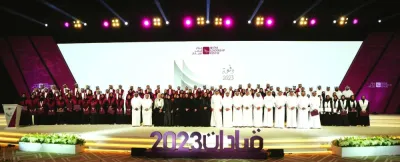Saudi Arabia and its allies refrained yesterday from imposing fresh sanctions on Qatar but voiced disappointment at the response to their demands and said their boycott of the country would continue.
Earlier in the day Qatar accused Saudi Arabia, the UAE, Bahrain and Egypt of “clear aggression” and said the allegations cited when they severed ties a month ago “were clearly designed to create anti-Qatar sentiment in the West”.
The four Arab nations accuse Qatar of supporting terrorism and allying with Iran - which Doha denies - and their foreign ministers met in Cairo yesterday after a deadline they gave Qatar to meet 13 demands expired.
The failure of the blockading countries to break Qatar’s steely resolve was evident from the joint statement issued at the end of their meeting.
“The response the four states got was overall negative and lacked any content. We find it did not provide a basis for Qatar to retreat from its policies,” Egyptian Foreign Minister Sameh Shoukry said, reading out the statement.
“The political and economic boycott will continue until Qatar changes its policies for the better,” Saudi Foreign Minister Adel al-Jubeir told a news conference.
The four foreign ministers said they would next meet in the Bahraini capital Manama though they gave no date.
Qatar’s response to the demands has not been made public.
The Arab countries have demanded Qatar curtail its support for the Muslim Brotherhood, shut down the pan-Arab Al Jazeera satellite TV channel, close a Turkish military base and downgrade its relations with Iran.
US President Donald Trump, while flying from Washington to Europe for
meetings in Warsaw and Hamburg, spoke about the dispute with Egyptian President Abdel Fattah al-Sisi.
“The visions of the two presidents on dealing with current regional crises were in line, especially when it comes to reaching political settlements which contribute to regional security and stability,” Sisi’s office said in a statement.
Trump called on all parties “to negotiate constructively to resolve the dispute” and reiterated the need for all countries to follow through on commitments to halt terrorist financing and “discredit extremist ideology,” the White House said.
US Secretary of State Rex Tillerson also spoke by phone with Saudi Crown Prince Mohamed bin Salman, a State Department official said.
In another phone call, Tillerson and the Emir of Kuwait Sheikh Sabah al-Ahmad al-Jaber al-Sabah discussed the latest developments on the regional and international arenas, the official Qatar News Agency said.
“Tillerson renewed US support for the Kuwaiti Emir’s efforts to overcome the current crisis in the region,” reported Kuwait News Agency.
HE the Qatari Foreign Minister, Sheikh Mohamed bin Abdulrahman al-Thani, told a session of London’s Chatham House think-tank that Doha was continuing to call for dialogue to settle the row.
Qatari officials say the Gulf states’ demands are so stiff they suspect they were never seriously meant for negotiation.
Commenting on the crisis, Arab League Secretary General AhmedAbul Gheit said the 22-member bloc supports Kuwaiti mediation.
Shoukry later told the On TV channel: “The demands are not negotiable. The matter from the beginning was not up for negotiations ... there is no middle ground.”
Meanwhile, Turkish President Tayyip Erdogan reaffirmed his country’s support for Qatar in its dispute with four other Arab states, saying their demands were unacceptable.
“When it comes to this list of 13 items ... it’s not acceptable under any circumstances,” Erdogan said in an interview with France 24 television.
Some of the terms were tantamount to “stripping” Qatar of its statehood, he added.
“We remain loyal to our agreement with Qatar. If it requests us to leave, we will not stay where we are not wanted,” he said.

FOCUS


